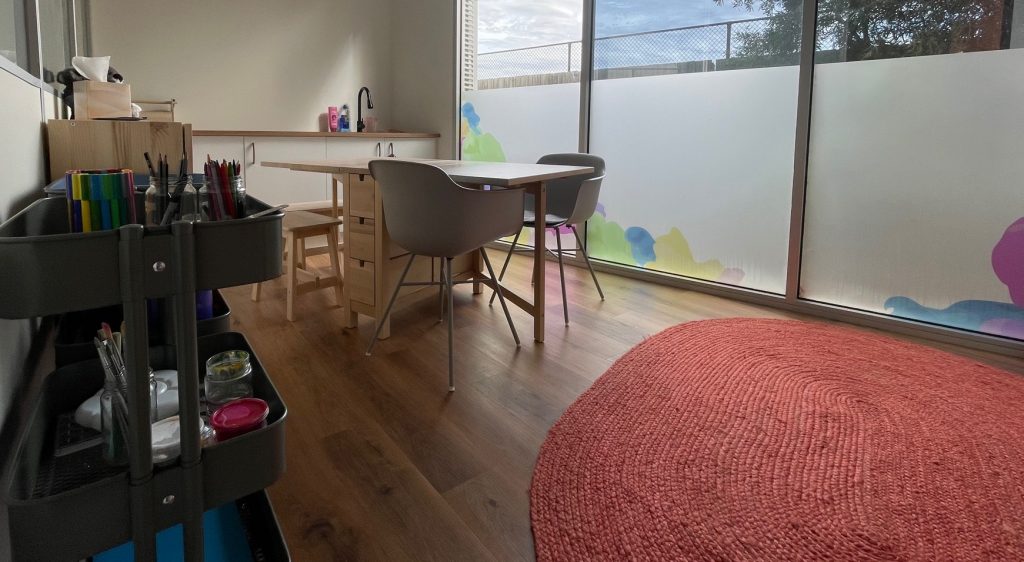Art Therapy
Art Therapy is a form of psychological therapy that focuses on non-verbal methods to relate to others and ourselves. Art Therapists use visual art materials in order to improve mental health.
The World Health Organisation conducted a study in 2019 on the arts in health and found that arts can be of value in the treatment and management of acute and chronic conditions. The report also concluded that the use of arts in health can also prevent a range of physical and mental health illnesses.
Art Therapy & the brain
Humans are all different and unique. We all have different needs in order to feel safe and supported. This goes for the tools and activities you will do in art therapy as well. Art materials and art therapy processes are carefully selected by the art therapist to meet the unique needs of each client. Different materials and activities target certain parts of the brain needed to process, regulate and express emotions. Artmaking offers clients a way to express and explore emotions that they may otherwise struggle to put into words. This helps the brain learn ways to cope with their emotions.
Some artmaking that may happen in an art therapy session includes:
- Painting
- Making playdough or slime
- Drawing
- Building a structure
- Sculpting
- Telling stories through characters
- Sensory exploration
- Collage
The great thing is, you don’t even need to have any artistic skill or interest! Just the act of making art, problem solving and thinking of ideas and concepts can be of therapeutic value. Art therapists are often creative people or artists themselves but we do not always focus on the finished product, as much as the process of making art itself. Art therapists are not art teachers and our sessions will focus on improving mental health rather than improving artistic skill – although sometimes both may happen.
Are Art Therapists qualified?
Art Therapists have a Master of Art Therapy and are members of ANZACATA. They are trained in counselling, mental health and the use of visual arts.
Who can benefit from Art Therapy?
Anyone! Including people experiencing:
- Autism
- Anxiety and/or Depression
- PTSD
- BPD
- Eating Disorders
- Low self-esteem
- Questions about gender and/or sexuality
What to expect in an Art Therapy session
Sessions are 50 minutes long and usually conducted face-to-face (however Zoom can be offered). The most important part of any therapy is building a relationship between the client, the therapist and the family or carers. Relationships are at the core of therapeutic work. We may start slowly using sensory materials and being less verbal. Sensory materials help to create emotional bonds and are often self-soothing.
Art Therapy is trauma-informed and person-centred. We aim to create a safe therapeutic space for you. The combination of art making, the choice of specific materials and a nurturing relationship creates a non-judgemental space where clients can express themselves through art or words at their own pace. Making art supports clients to better understand and manage their internal emotional world in ways that they have never been able to do with words.
Art Therapy can help with:
- Building social skills
- Developing problem solving skils
- Exploring challenging thoughts and feelings
- Expanding emotional literacy
- Healing from traumatic experiences
- Improving self-esteem
- Strengthen emotional regulation skills
When I make art at home is it “Art Therapy”?
No, art therapy is done with a qualified art therapist who is there to offer you support. However, at home you can make art for wellbeing and pleasure. One activity I always recommend is to draw or trace a circle (it can be wonky) and fill the circle with colour, shapes, patterns or symbols. Research has shown this reduces anxiety, so it is definitely worth giving it a go.
Art therapy can sound like an unusual and unfamiliar psychological support, but can really be great for people who struggle to talk about how they are feeling. If you are interested in art therapy please contact us.

Our Services
Ready to make an appointment?
Need help right now?
You can call or use webchat if you are feeling suicidal, are affected by suicide or are worried about someone who you think is considering suicide to get support and help. The web chat option does require you to register and create a password, so there are a few steps to this in case this may add to your overwhelm.
If you’re experiencing thoughts of self-harm or suicide:
Call Kids Help Line any time for any reason if you need help, especially if you are struggling with difficult emotions or are feeling distressed. They are there to talk to you and help. For anyone 25 or under.
The Lifeline phone line is available 24/7. Their text line is open midday to midnight and requires you to answer some pre-survey questions to register to use the service. Text: 0477 13 11 14 Webchat is available 7pm-midnight and can be anonymous, there are questions, but they are not mandatory to answer.
For all ages.
If you have difficulties relating to your gender or sexuality, the Q-life service may be able to help.
Q-Life is a free anonymous phone or webchat service run by Switchboard. The service is open 3pm – midnight every day. They do not offer ongoing counselling, rather they can offer support regarding any issues you are having related to gender or sexuality that you would like to discuss anonymously.
- 1800 184 527
- www.switchboard.org.au/qlife for online chat
